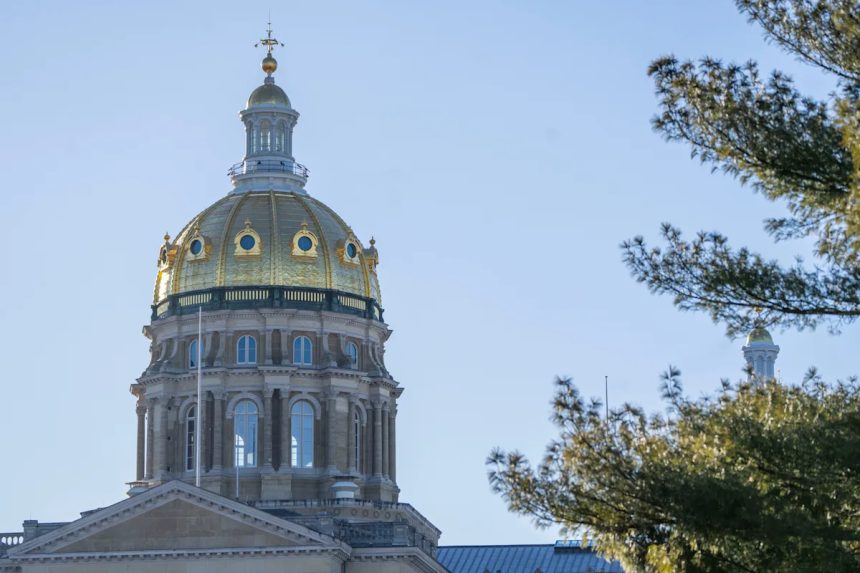Iowa will bring in $800 million less in revenue compared with last year — a 9% drop — as Republican-backed state and federal tax cuts take effect and uncertainty in the agriculture economy continues.
The forecast from Iowa’s three-member Revenue Estimating Conference predicts that Iowa will take in $8.13 billion in revenue in fiscal year 2026, which ends June 30, 2026.
That’s down from $8.94 billion in revenue in fiscal year 2026 and $9.76 billion in fiscal year 2024.
Iowa lawmakers approved a $9.42 billion state budget in May, leaving a $1.3 billion gap that the state will have to fill using its budget surplus and Taxpayer Relief Fund.
State revenues are expected to rebound slightly to $8.39 billion in fiscal year 2027 for a 3.2% increase, the panel estimates.
Much of the impact comes from Iowa’s 3.8% flat income tax rate, which went into effect Jan. 1. Changes from President Donald Trump’s “so-called “One Big Beautiful Bill,” including tax cuts for overtime pay, are also further reducing state revenues.
Department of Management Director Kraig Paulsen said Republican policymakers planned for the drop in revenue.
“When you cut taxes, you leave more in the pockets of hardworking Iowans,” Paulsen said. “To be clear, however, the state of Iowa because of the spending discipline, continues to be in an excellent financial position.”
House Minority Leader Brian Meyer, D-Des Moines, told reporters Republicans have a “billion-dollar problem,” criticizing the majority party for tax cuts and spending on private school education savings accounts, which will cost the state more than $300 million this year.
“They have thrown the state into a fiscal death spiral,” Meyer said. “And that death spiral is a result of their corporate tax cuts, vouchers and tax cuts for the wealthy in this state.”
Republicans say the state has money to pay its bills, including a roughly $1.9 billion budget surplus and $4 billion in the Taxpayer Relief Fund.
“Despite a mixed economic picture locally and nationally, Iowa remains in a strong financial position,” said Rep. Gary Mohr, R-Bettendorf, who chairs the House Appropriations Committee. We have over $6 billion in cash on hand, and our reserve funds are at their statutory maximums. Iowa is in a better position than most states to handle economic uncertainties due to Iowa Republicans’ responsible budgeting over the past decade.”
Senate Minority Leader Janice Weiner, D-Iowa City, said Iowa’s economy is in poor shape after years of Republican control.
“Numbers show what top economists have been saying and what Iowans are already feeling: that we’re in or on the brink of recession,” she said. “Our Republican colleagues claim they planned for it, but they didn’t plan for this. Our economy is shrinking, our revenues are collapsing, we’re spending more than we’re taking in.”
The agriculture sector has struggled, with low corn and soybean prices contributing to declining farmland values. Farmers have also struggled with the impact of tariffs from the Trump administration. And President Donald Trump has floated a $10 billion to $14 billion farm bailout.
Gov. Kim Reynolds acknowledged that “we’re going through some tough times, especially with agriculture.”
She criticized trade policy under Democratic President Joe Biden and praised Trump for pursuing trade deals.
“For the third year in a row, we’ve seen some really tough markets for our farmers,” she told reporters Oct. 16. “Also, Biden did absolutely nothing when it came to trade for four years, and we’re paying a price of that. So we have a president, President Trump, that is stepping in and trying to address just the lack of even talking about trade for the last four years to make it more fair. So I appreciate what he’s doing.”
But Republicans say Iowa’s economy more broadly is in a good position. They pointed to a Sep. 26 report from the U.S. Bureau of Economic Analysis that found Iowa’s gross domestic product grew 3.7% in the second quarter of the year, just below the national average of 3.8%.
“There has been good news about the economy over the last few weeks,” Senate Majority Leader Mike Klimesh, R-Spillville, said in a statement. “Iowa’s GDP growth in the second quarter of this year was revised up thirty spots and was rated eighteenth in the country. The Iowa Business Council also projects a positive six-month economic outlook with more private sector investment in our economy and more job opportunities for Iowans. We have been conservative with our spending, our reserves are full, and the budget is sound as the economy continues to change.”
Stephen Gruber-Miller covers the Iowa Statehouse and politics for the Register. He can be reached by email at sgrubermil@registermedia.com or by phone at 515-284-8169. Follow him on X at @sgrubermiller.
This article originally appeared on Des Moines Register: Iowa’s revenues to drop by $800 million from last year amid tax cuts









